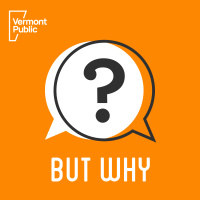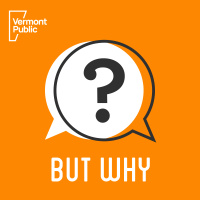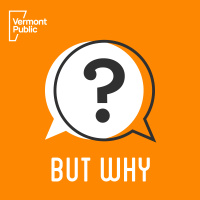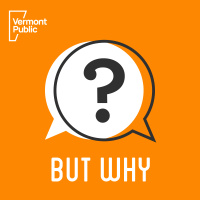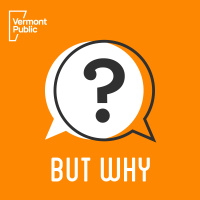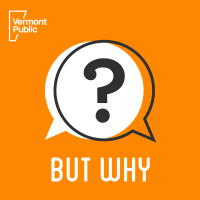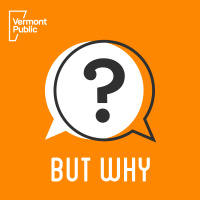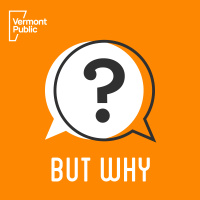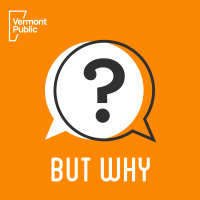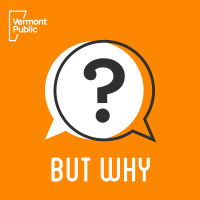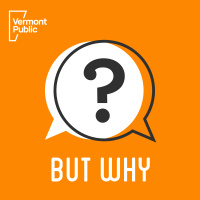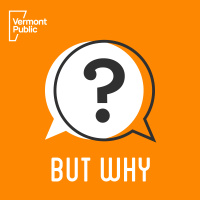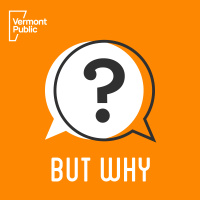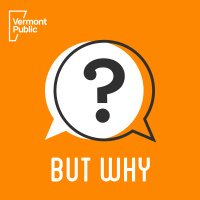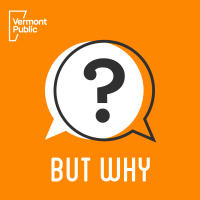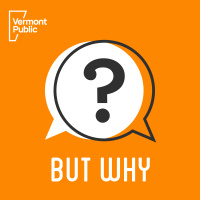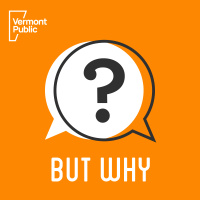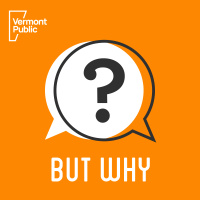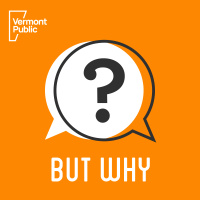Synopsis
But Why is a show led by kids. They ask the questions and we find the answers. Its a big interesting world out there. On But Why, we tackle topics large and small, about nature, words, even the end of the world. Know a kid with a question? Record it with a smartphone. Be sure to include your kid's first name, age, and town and send the recording to questions@butwhykids.org!
Episodes
-
Why Are Boys Boys And Girls Girls?
07/06/2019 Duration: 33minThis week we're answering questions about gender. We've gotten a lot of questions about the differences between boys and girls so we're tackling them with Vanderbilt anthropologist Anna Catesby Yant and Dr. Lori Racha of UVM Medical Center. This is a frank but age-appropriate conversation about male and female bodies and about how biological sex differs from gender. We think the whole family will enjoy this episode, but you're always free to give our episodes a listen to see if it's right for your young ones. Other questions in this episode: Why are boys taller than girls? Do only boys have Adam's apples? Why can't girls grow beards? Why do most boys have short hair? Why do girls wear makeup and boys don't? Why do professional sports have all-men's and all-women's teams? Why can more girls do the splits than boys? Why didn't women have as many rights as men back in the olden days? Download our learning guides: PDF | Google Slide | Transcript
-
How Do Mussels Get Their Shells?
24/05/2019 Duration: 24minWe're heading to the coast of Maine to learn a little bit about why the sea is salty and how mussels get their shells with Zach Whitener, a research associate at the Gulf of Maine Research Institute in Portland, Maine. We also get an answer to a question to how you get a ship in a bottle from Colorado-based ship-in-bottle builder Daniel Siemens in this encore episode from 2016. Download our learning guides: PDF | Google Slide | Transcript | Ship In Bottle Plans
-
Why Am I Afraid Of The Dark?
10/05/2019 Duration: 33minLots of people are afraid of the dark, including many kids who have shared that fear with us. In today's episode we explore the fear of the dark with Daniel Handler, better known as Lemony Snicket, the author of the Series of Unfortunate Events books, and a picture book for young kids called The Dark. Then we go on a night hike with Vermont Fish and Wildlife biologist Steve Perren, to talk about ways to embrace the darkness. We practice our night vision by not using flashlights and we think about how our other senses can help us navigate. Steve also answers questions about how animals see in the dark and why it sometimes look like animals' eyes are glowing back at us in the darkness.
-
Why Is Sugar Bad For You?
26/04/2019 Duration: 29minWhy do we need to eat and how does food give us energy? Why do you have to eat vegetables? Why does junk food taste so good? So many questions about food and nutrition. We get answers from Wesley Delbridge, of the American Academy of Nutrition and Dietetics. Other questions in this episode include: Why does eating salty food make you thirsty? Why is sugar bad for you? Why are vitamins in food? Why is breakfast so important? Why do children get hungry at night? Why is fast food so popular?
-
"Do Skunks Like Their Own Smell?" And Other Stumpers!
12/04/2019 Duration: 20minToday, 10 questions with one answer in common: "That's a good question!" We've picked 10 stumpers, like: Why don't we suffocate in cars when we're driving? How do we know where our mouths are? Why are there more boys than girls in books? Do monkeys every touch the ground? Why don't fish get electrocuted when lightning strikes? Where does the sidewalk end? Our experts include naturalists Mary Holland, author Grace Lin, primatologist Sofia Carrara, pediatrician Laurie Racha, Dan Goodman of AAA of Northern New England, and the poetry of Shel Silverstein.
-
Who Makes The Laws?
29/03/2019 Duration: 24minWho makes the laws? That's what 5-year-old Paxton from Kelowna, British Columbia wants to know! We learn about laws with Mike Doyle of the Canadian organization Civix, and Syl Sobel, author of How the U.S. Government Works. We also answer a question from Charlotte in North Carolina: how do elections work? And Hattie in England asks why her country has a government and a queen.
-
Still Funny: Why Do We Laugh?
15/03/2019 Duration: 25minWhy do we laugh? Why do you feel ticklish when someone tickles you? Why can't you tickle yourself? In this episode, originally from 2018, we learn about how humor develops with Gina Mireault of the Infant Laughter Project at Northern Vermont University. Plus: April Fools traditions and we listen to jokes sent in by kids with Vermont comedian Josie Leavitt.
-
How Is But Why Made? What Is Sound?
01/03/2019 Duration: 29minIn this episode of But Why, we're answering your questions about...us! Why do you make But Why? How are podcasts made? And we're answering questions about the physics of sound and radio. What is sound and how is it made? Why are sound waves invisible? How do echoes work? How do microphones work? How do radio signals work? Answers to your sound and radio questions from our VPR colleagues: sound engineer Chris Albertine and Chief Technology Officer Joe Tymecki.
-
Why Is There A Big Patch Of Garbage In The Pacific Ocean?
15/02/2019 Duration: 24minWhy is there a big patch of garbage in the Pacific Ocean? Four-year-old Leon has heard of the Great Pacific Garbage Patch and he wants to know what the deal is. So we speak with someone who's actually been there! Teen Vogue News and Politics Editor Alli Maloney visited the garbage patch last year for a series called Plastic Planet. But in this episode we'll also explore how young people are becoming activists, trying to reduce the amount of plastic waste produced, waste that sometimes goes into the ocean. Anika Ballent, with the non-profit Algalita, shares what kids can and have been doing. Download our learning guides: PDF | Google Slide | Transcript "Why is there a big patch of garbage in the Pacific Ocean?" - Leon, 4, Minneapolis, MN The Great Pacific Garbage Patch is an area in the middle of the ocean between California/Mexico and Hawaii where there's a high concenration of plastic waste. The Garbage Patch is a really big spot: 1.6 million square kilometers, almost 618,000 square miles. This part of
-
Why Do Elephants Have Trunks? Why Do Giraffes Have Purple Tongues?
01/02/2019 Duration: 20minWe're exploring two different animals in today's episode. One has a long neck and the other has a long trunk! We'll answer: Why are elephants so big? How do their trunks work? Why do they have tusks? Why is elephant skin so rough? Do elephants stomp? Are they actually afraid of mice? And Why are elephants being poached? Peter Wrege of the Elephant Listening Project, which studies elephants in Central African Republic, answers elephant questions. And Steph Fennessy, from the Giraffe Conservation Foundation in Namibia, answers these questions about giraffes: Why do giraffes have long necks? Why do animals have different patterns, like zebras, giraffes, cheetah? What's a giraffe's usual life span? And why are their tongues purple?
-
Why Do Days Start At 12 O'Clock?
18/01/2019 Duration: 30minHow was time created? How did one minute become 60 seconds and one hour became 60 minutes? Why is time segmented into 12-hour periods? How do clocks work? Why is a year 365 days? Why is there an extra day in February every four years? Does time have a beginning or an end? Is time travel possible? Answers to all of your time questions with Andrew Novick of NIST, the National Institute of Standards and Technology.
-
Why Do We Sometimes See The Moon During The Day?
04/01/2019 Duration: 20minWhy does the moon change shape? How much does the moon weigh? What color is the moon? Why does the Earth only have one moon? Why does the moon have holes? Where does the moon go when we can't see it? Why do we sometimes see the moon in the daytime? Why does the moon look like it's following you when you're in the car? Answers to your moon questions with John O'Meara, chief scientist at the W.M. Keck Observatory.
-
What Is It Like To Be An Adult?
21/12/2018 Duration: 29minWhat is it like to be an adult? It's a big question from a young mind! We invited adults who listen to share their perspectives and Nora McInerny, host of the podcast Terrible, Thanks for Asking, helps guide us through that and a few other questions about the strange world of adults: Why can adults do things that kids can't do? Why don't adults play pretend like they used to when they were kids? What happens when you don't listen to your boss? And why do people cry when they're happy?
-
Why Do We Poop And Fart?
07/12/2018 Duration: 24minHow does your body make poop? How many germs are in an ounce of poop? Why do people fart and why are farts stinky? Look, everybody does it, so today we're going to tackle one of the areas kids seem to find fascinating: why and how we poop! Plus, we get some help from Chicago public radio station WBEZ's Curious City to learn about what happens after you flush the toilet.
-
Circle Round: 'Armadillo's Song'
20/11/2018 Duration: 18minThis week, instead of a normal episode, we're bringing you an episode from one of our podcast friends, Circle Round, from WBUR in Boston. Circle Round features folk tales from around the world, and we've selected one we think you'll really enjoy. French comedian Gad Elmaleh stars in "Armadillo's Song," a story about achieving goals and proving naysayers wrong!
-
Why Don't Spiders Get Stuck In Their Webs?
09/11/2018 Duration: 29minWhy don't spiders stick to their own webs? How do spiders walk up walls and on ceilings without falling? Why do spiders have eight legs and eight eyes? How do they make webs? And silk? What's a cobweb? How do spiders eat? And why are daddy long legs called daddy long legs when they have to have a female to produce babies?! We're talking spiders today with arachnologist Catherine Scott. Download our learning guides: Transcript| Coloring Page
-
Why Do We Celebrate Halloween?
26/10/2018 Duration: 21minWhy do we celebrate Halloween? Who created this holiday? Where do pumpkins come from and why do we carve them? This week we're answering your Halloween questions with a professor of all kinds of scary and creepy things, Regina Hansen of Boston University.
-
Living With A Brain Tumor: 11-Year-Old Twins Share Their Story
12/10/2018 Duration: 18minIn today's episode we're not answering any questions. Instead, we're going to talk with 11-year-old twins Isabelle and Sophie Posner-Brown. When Sophie was two, she was diagnosed with a malignant brain tumor. She's had three surgeries and lots of chemotherapy, but she's been on a break from chemo for the last four years. The twins talked with But Why about what it's like to live with Sophie's illness.
-
Why Do People Get Cancer?
28/09/2018 Duration: 19minA cancer diagnosis can be scary, and for kids it can be bewildering. We've gotten some questions about cancer and in this episode we answer them with Dr. Donald Small, director of pediatric oncology at Johns Hopkins School of Medicine. We answer how people get sick when it's not caused by germs, how people get cancer, and why cancer "does not have a cure." There's nothing graphic or scary in this episode, but adults may want to give this episode a listen if cancer is something your littles have been dealing with.
-
Kangaroos, Koalas, and Wombats! Why Don’t They Live In Cities?
14/09/2018 Duration: 20minWe'll learn about the kinds of animals that live in urban environments and the challenges they face! One young Australian listener wants to know why wombats, kangaroos and koalas hang out in the countryside rather than the city. Dr. Mark Eldridge from the Australian Museum Research Institute tackles that one. And we turn our focus to one particular urban dweller, the raccoon, with York University raccoon expert Suzanne MacDonald. She lives in Toronto, which has one of the most dense populations of raccoons in the world. She helps answer why raccoons eat garbage, how long they live and why they look like they're wearing masks.

